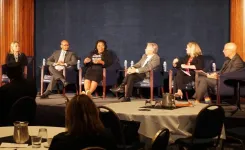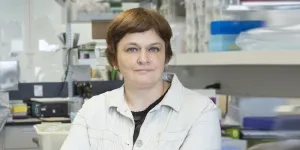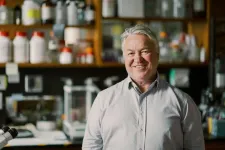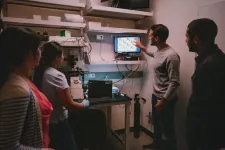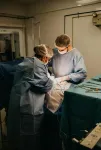“Our work at NCCN has always been rooted in equity; we want to ensure everyone has access to the latest evidence-based expert consensus-driven recommendations for cancer care, so all patients can live better lives,” stated Crystal S. Denlinger, MD, Chief Executive Officer, NCCN. “For nearly 30 years, the NCCN Guidelines have provided roadmaps that enable people with cancer to be treated according to the high-quality evidence-based care that is best for them. In recent years, we have expanded our focus on additional factors that contribute to disparities in outcomes, including underrepresented groups among oncology care providers and in clinical trials. Improving representation for all people affected by cancer both in the oncology workforce and within oncology research will help us to improve treatment options and care delivery for every patient.”
"I commend NCCN for its unwavering leadership in advancing equity and inclusion within oncology,” said Terrance Mayes, EdD, Associate Dean for Equity and Strategic Initiatives, Executive Director, Commission on Justice and Equity, Stanford University. Dr. Mayes also serves as Co-Chair for the NCCN DEI Directors Forum. “In today’s rapidly evolving landscape, this summit is more crucial than ever, providing us with a vital opportunity to reimagine how we can further integrate Diversity, Equity, Inclusion, and Belonging (DEIB) into our core missions."
“At the University of Chicago, we are dedicated to hiring and training a diverse workforce that represents the community we serve,” noted Lauren Wall, Senior Director Cancer Clinical Trials Office, University of Chicago, a Member of the NCCN Board of Directors Executive Committee. “One of our strategies includes partnering with our local community colleges, City Colleges of Chicago, to build internships and apprenticeships within the field of clinical research—exposing students to exciting career opportunities. Ultimately, building programs like this will foster greater diversity within the cancer research workforce, which is essential for inclusive cancer research and cancer health equity.”
Speakers at the summit discussed how culture starts at the top and stressed the importance of having inclusive leadership. They also noted the impact of incorporating DEI values into strategic planning and budgets, particularly at NCI-designated centers, where enacting a Plan to Enhance Diversity (PED) is now a requirement to remain eligible for the federally funded Cancer Center Support Grant.
“To improve cancer care outcomes, it is important to address workforce diversity because representation matters. This must be done through the lens of health equity and in an inclusive manner, for the efforts to remain sustainable,” stated Deborah Grimes, RN, JD, MSHQS, Senior Vice President, Chief Diversity Officer, Ochsner Health.
“Providing respectful care of the highest quality possible—that everyone deserves—requires a culture of empathy and a workforce that reflects the community served by the organization,” agreed Chyke A. Doubeni, MD, MPH, Chief Health Equity Officer, The Ohio State University Comprehensive Cancer Center – James Cancer Hospital and Solove Research Institute. “Healthcare services, workplaces, schools, and research activities must be truly inclusive, and that should be reflected in actions, culture, and policies throughout our society. I believe those principles are intrinsic human values, even as the pendulum of societal views on diversity, equity, and inclusion swings widely. It is critical for us to work collectively as a society to identify our shared values and perspectives to create diverse and inclusive organizations and communities.”
Clinical trials that do not include diverse populations may not accurately represent the real-world population, resulting in treatments that are less effective or even harmful for certain groups of people. Guidance regarding enhancing diversity in clinical trials released by the Food and Drug Administration (FDA) over the past few years is also helping motivate sponsors to develop plans that increase diversity in clinical trial enrollment. Under-representation of certain groups may also be mitigated by an increased emphasis on shared decision making—one published study from 2022 that looked at Black women with metastatic breast cancer found that just 40% said that they had been offered a trial, while more than 80% would have considered it.1
“The lack of diversity in clinical trials affects the quality of care that can be delivered,” explained Eugene Manley, Jr., PhD, Founder & Chief Executive Officer, STEMM & Cancer Health Equity Foundation. “The challenges go back as far as not having basic research tools that reflect everybody—including better representation in cell lines. We have to do a better job of being out in the community, explaining basic medical information and cancer information to our most marginalized populations so that they can have access to equitable care. Increasing diversity in the oncology and STEMM workforce, mentoring diverse scholars, and reflecting people’s lived experiences in outreach materials can have a big impact on care delivery.”
Speakers pointed out that when it comes to hiring practices, the ultimate goal is to find the best person for the job; something that historical hiring approaches may have failed to do by unintentionally excluding underrepresented candidates. Panelists also acknowledged that some of the terminology around equity has been misconstrued, leading to patchwork laws and backlash that can create barriers, such as a ban on scholarships targeted at specific populations. They recommended working closely with legal advisors when initiating new programs, considering DEI to be just one aspect of overall hiring practices, and valuing the work being done more than what it is called.
“There continue to be legal challenges to workplace DEI programs, particularly programs designed to increase opportunities for people from groups who are underrepresented in the profession,” said Heather Alarcon, JD, Senior Director of Legal Services, Association of American Medical Colleges. “This has led some employers to shy away from DEI programming more than necessary. There are many diversity-promoting practices that companies can adopt that have been endorsed by the law, particularly in ensuring a robust recruitment process that looks for talent everywhere.”
According to Christopher Li, MD, PhD, Vice President, Faculty Affairs and Diversity, Fred Hutchinson Cancer Center: “Barriers to advancing DEI at cancer centers are present at cultural, institutional, interpersonal, and personal levels. Effective DEI strategies must address these barriers in a systematic and coordinated way, from evaluation of institutional policies and practices to understanding individual attitudes and beliefs, and be implemented across approaches to recruitment, retention, career advancement and leadership development.”
Amy Garrett, DrPH, MA, ACRP-CP, Associate Principal Scientist, Oncology Clinical Operations, Merck & Co, Inc., and Rodney Tucker, MD, MMM, Associate Director for Access, Belonging, and Culture, O’Neal Comprehensive Cancer Center, were also panel members. Clifford Goodman, PhD, Healthcare Consultant, served as moderator and Alyssa Schatz, MSW, Vice President, Policy & Advocacy for NCCN, provided concluding remarks.
There was also a series of best practices presentations, featuring:
Shiva Bidar-Sielaff, MA, CDM, Vice President/Chief Diversity Officer and Associate Dean for Diversity & Equity Transformation, UW Health and UW School of Medicine & Public Health/UW Carbone Cancer Center Nikia Clark-Robinson, BS, Director, Community Outreach & Engagement, Roswell Park Comprehensive Cancer Center Kemi Doll, MD, MS, Professor, Department of Obstetrics and Gynecology, University of Washington School of Medicine Carmen E. Guerra, MD, Professor of Medicine, Abramson Cancer Center of the University of Pennsylvania Danielle Mitchell, Chief Executive Officer/Founder, Black Women in Clinical Research Next up for the NCCN Policy Program will be the annual NCCN Patient Advocacy Summit on December 6, 2024, focused on patient education. Learn more at NCCN.org/summits.
# # #
About the National Comprehensive Cancer Network
The National Comprehensive Cancer Network® (NCCN®) is a not-for-profit alliance of leading cancer centers devoted to patient care, research, and education. NCCN is dedicated to improving and facilitating quality, effective, equitable, and accessible cancer care so all patients can live better lives. The NCCN Clinical Practice Guidelines in Oncology (NCCN Guidelines®) provide transparent, evidence-based, expert consensus recommendations for cancer treatment, prevention, and supportive services; they are the recognized standard for clinical direction and policy in cancer management and the most thorough and frequently-updated clinical practice guidelines available in any area of medicine. The NCCN Guidelines for Patients® provide expert cancer treatment information to inform and empower patients and caregivers, through support from the NCCN Foundation®. NCCN also advances continuing education, global initiatives, policy, and research collaboration and publication in oncology. Visit NCCN.org for more information.
[1] Chen A. Many Black cancer patients say they aren’t offered the chance at clinical trials, survey finds. STAT. Published June 6, 2022. https://www.statnews.com/2022/06/06/black-cancer-patients-not-offered-access-to-clinical-trials/
END
